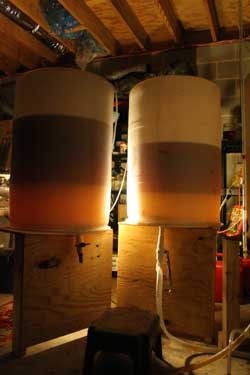One of Africa’s most successful entrepreneurs, Dr. Mo Ibrahim, has set up a foundation and announced a $5 Million prize for the most effective, least corrupt, and all around best-of-the-best African leader. (HT to BRE)
In an interview with the Financial Times newspaper, Mr Ibrahim, 60, said leaders had no life after office.
“Suddenly all the mansions, cars, food, wine is withdrawn. Some find it difficult to rent a house in the capital. That incites corruption; it incites people to cling to power.
“The prize will offer essentially good people, who may be wavering, the chance to opt for the good life after office,” said Mr Ibrahim.
Prize offered to Africa’s leaders, BBC News, 26 October 2006
Pretty clever. Pay them to be good. I think that, in general, politicians are underpaid – and not just in Africa. I am not so naive to think that money is a cure-all for corruption. But if the salaries of public office were halfway competitive with the industry, there’d be fewer nutcases running for office. OK – nevermind that – not fewer nutcases, just more halfway sane, pragmatic technocrats.
In Africa this problem is much worse. Not only is politics extremely dangerous in some parts, but there is also very little in terms of retirement benefits, beyond what you can squirrel away during your time in office. That’s not a situation that provides a lot of incentive to most sane, intelligent people to chose public office as a career.
This initiative deserves the spotlight also because it highlights the key problem Africa faces: leadership, and the lack thereof. Just the other day I asked a Togolese friend “Mon frère, what is Africa’s biggest problem?” I explained that if he could solve one problem on the continent, what would it be? Malaria? AIDS? Hunger? Poverty? Celebrity adoptions?
“Leadership!” He said. Without decent leaders democracy cannot work. Without democracy, there cannot be much progress, social or economic. Without progress we can never solve poverty, hunger and the public health crises. And there will always be another genocide somewhere.
This is why I am skeptical about those “big money” campaigns by Americans and Europeans to raise huge sums for development aid for Africa. It’s like they are refueling and changing the tires on a racecar that’s going the wrong way on the track because the driver is drunk. Dr Ibrahim says: let’s reward the driver who can drive well! Congratulations!
See Jewels in the Jungle for more info.
 Happy Hannukkah!
Happy Hannukkah! Today I got my
Today I got my  My latest batch of biodiesel is looking pretty good. I washed it all week. I even built another washtank (left). Maybe tomorrow I’ll start drying part of the batch. There is no hurry – I still have about 30 gallons in stock.
My latest batch of biodiesel is looking pretty good. I washed it all week. I even built another washtank (left). Maybe tomorrow I’ll start drying part of the batch. There is no hurry – I still have about 30 gallons in stock. Last week I spent two evenings getting 200 liters of veggie ready for processing. After I filtered the oil, I pumped it into the waterheater and heated it to 120 Deg. F. Then I pumped the warm oil into an empty tank to evaporate the water and to dry the oil. Yesterday, I finally got the batch going – my first 50-gallon (200 liter) batch of biodiesel. When I add the 40 liters/10 gallons of methoxide the reactor is just about full to capacity. The batch is settling now, and this afternoon I’ll pump it out and start washing it.
Last week I spent two evenings getting 200 liters of veggie ready for processing. After I filtered the oil, I pumped it into the waterheater and heated it to 120 Deg. F. Then I pumped the warm oil into an empty tank to evaporate the water and to dry the oil. Yesterday, I finally got the batch going – my first 50-gallon (200 liter) batch of biodiesel. When I add the 40 liters/10 gallons of methoxide the reactor is just about full to capacity. The batch is settling now, and this afternoon I’ll pump it out and start washing it. The Democrats are celebrating a pretty significant victory. Personally I like the sound of Republican heads popping whenever someone says “House Speaker Pelosi” … try it:
The Democrats are celebrating a pretty significant victory. Personally I like the sound of Republican heads popping whenever someone says “House Speaker Pelosi” … try it:

